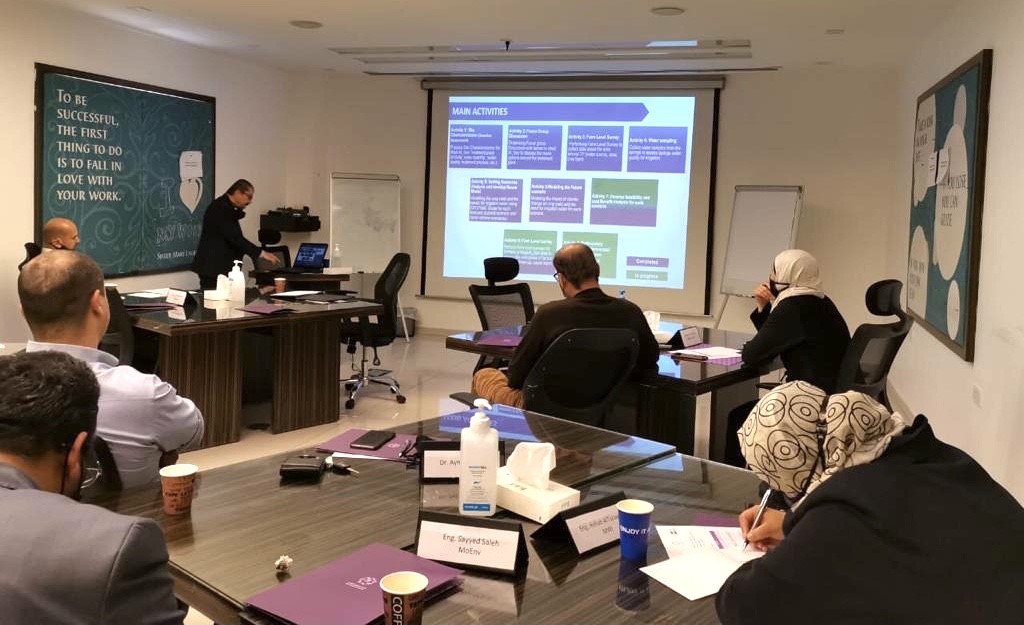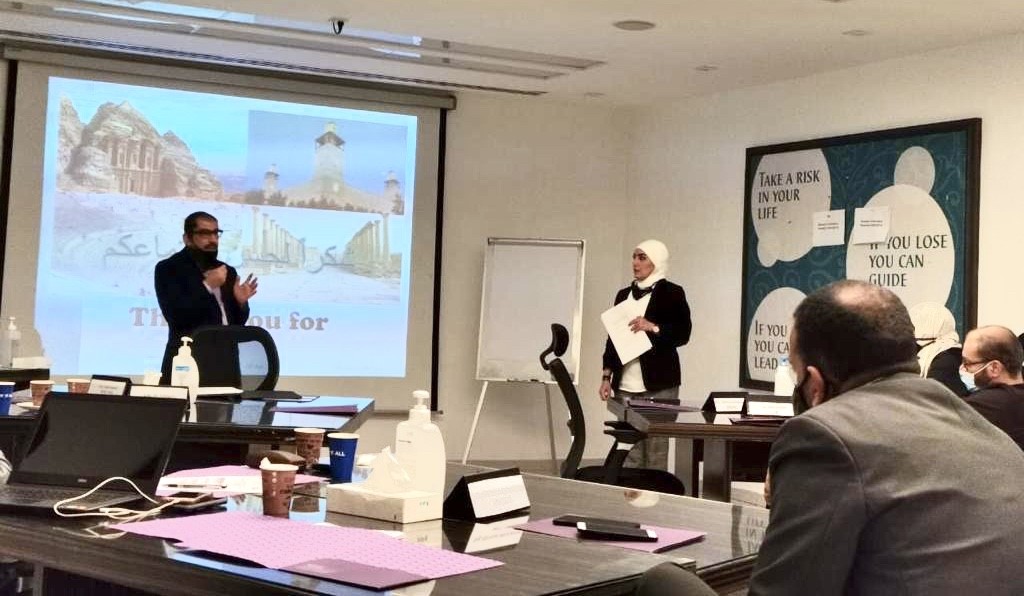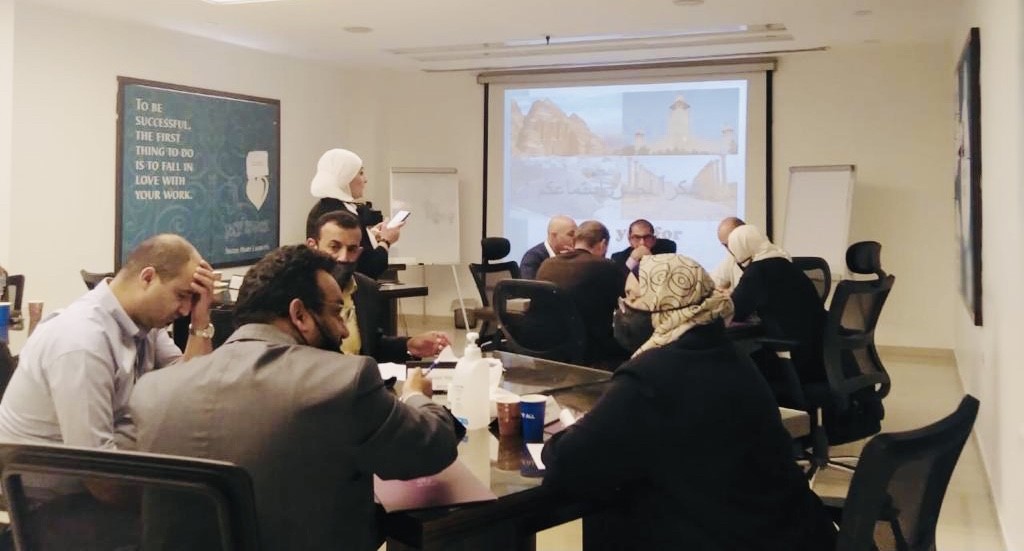Supporting Policy Reforms of Water Reuse at the 4th Steering Committee Meeting in Jordan

The ReWater MENA project held The 4th Steering Committee (SC) meeting in Jordan on 7 April 2021, in partnership with the Royal Scientific Society (RSS). The project aims to expand safe reuse of treated wastewater in the Middle East and North Africa (MENA) region, to cope with growing population, socio-economic development and climate change. ReWater MENA uses a participatory approach that ensures effective participation of concerned stakeholders in decision making process in Egypt, Lebanon and Jordan. In this regard, it equips key stakeholders in the three countries, by forming high level SC, to provide scientific knowledge for the project and pave the way for the desired outcomes.
In Jordan, water scarcity is a major concern; water share per capita is estimated to 100 m3/capita/year, while the water poverty limit is determined at 500 m3/capita/year. The country tends to expand its water reuse strategies for agriculture purpose to secure food for the growing population and reduce stress on traditional water sources. Thus, treated wastewater plays an important role to reduce the gap between water supply and water demand. Therefore, polices of water reuse need to be changed in Jordan to fit the safe reuse options, also, the project tends to shift the traditional paradigm to adapt new options for water reuse.
The meeting brought diverse and key stakeholders together to discuss policy reforms of water reuse in Jordan to achieve integrated water management taking into account sustainability of water resources and environmental protection. The invited stakeholders were representatives presenting; The Ministry of Water and Irrigation (MWI), Water Authority (WAJ), Jordan Valley Authority (JVA), Ministry of Environment (MoEnv), Ministry of Agriculture (MoA), and the Ministry of Health (MoH). The following issues were presented and discussed during the SC meeting. First, the progress of ReWater project that has been done in Jordan and ongoing activities regarding The Reuse Models updates. Second, the wastewater reuse policies & regulations, and water tariff. Third, the irrigation water quality guidelines compared to reclaimed domestic wastewater standards.

Eng. Husam Haj Ali from RSS started the meeting, he welcomed the committee members and went through the meeting agenda which focused on the steering committee contribution in the reuse policy reforms. Eng. Husam presented the local studies of Northern Jordan Valley and Wadi Sir; He illustrated the completed activities and highlighted the activities in progress regarding reuse modeling updates using CROPWAT Model for both sites. He focused on the main activities of baseline assessment, national learning alliance with farmers, data collection and finally, he explained the developed scenarios, current scenario and reuse options scenarios with the findings for both sites so far.
WAJ represented in Eng. Enaya Natsheh concentrated on Policies and Guidelines of water reuse, as well as identification of water recycling in Jordan. She highlighted the water sector in Jordan with focus on water scarcity challenges. Eng. Enaya demonstrated the undertaken policy reforms regarding efficient utilization of freshwater and recycling available water in Jordan so far. She explained the national strategy of water (2016-2025) which is deemed as the vision and reference for the water sector. The strategy recommends reforms in the existing legal and institutional frameworks for better water management in Jordan. She also showed the policies of water recycling and goals beyond as well as justifications for water recycling. The limitations that face water recycling in Jordan in terms of quality, quantity and economic aspects were discussed. Furthermore, she emphasized on standards and guidelines of water reuse in Jordan that must be match with the standards of Agriculture Organization (FAO) and World Health Organization (WHO).
Eng. Sayed Saleh from (MoEnv) highlighted the role of governmental stakeholders in the wastewater reuse, water & wastewater legal framework including laws, regulations, standards and guidelines. He explained the technical specifications of water recycling, use of biosolids and sludge disposal. He showed the national standards and guidelines of water used for irrigation in Jordan compared to the international guidelines FAO and WHO regarding black and grey waters. Eng. Saleh confirmed on health and environmental protection must be considered in policy formulation.
Eventually, Eng. Rana Ardah from RSS, who led the discussion after that dividing the committee members into two groups to discuss updating the policies and regulations of wastewater reuse. The first group discussed water reuse standards and guidelines while, the second discussed the water reuse policies and potential for policies update. Both, groups agreed on and suggested some major points on water reuse in Jordan. They focused on mobilizing the role and responsibility of governmental stakeholders in terms of decreasing the amount of waste discharges and increasing the amount of recycled wastewater. Also, they emphasized on changing the perception of recycled wastewater users by raising the farmers' awareness and making incentives by reducing recycled water's tariff.
Water quality parameters of recycled wastewater were also discussed. Both groups saw that the limits of Nitrogen, Phosphorus, and Potassium (N, P, and K) must be revised to fit the reuse options, some plantations require certain standards of water quality for example TDS less than 1000 mg/liter. In this regard, they asserted on improving quality of data and fill the gaps in data gathered with focus on data contradictions. Furthermore, they pointed out the role of concerned stakeholders should be activated in water quality monitoring from waste discharges to the treated wastewater. Finally, formulate a “Wastewater Reuse Committee” including MoWI, MoAgr, and MoEnv representatives to control the use of the treated water.

In conclusion, the 4th Steering Committee meeting came up with recommendations on water reuse in Jordan. The meeting concentrated on the technical and social aspects regarding eliminating of untreated waste discharges and disseminating use of treated wastewater through increasing public awareness and incentives for water reuse. Also, the concerned stakeholders discussed the standards and guidelines of wastewater recycling and they emphasized on changing in policies of wastewater recycling and activate the role of governmental bodies in water quality monitoring. The meeting recommended to initiate the Wastewater Reuse Committee to control the use of treated wastewater. The recommendations also targeted the soil conservation of preventing salts accumulation by activating the drainage system. Furthermore, improve the quality of waste discharges through rehabilitation of wastewater treatment plants. In addition to, promote water governance principles and finally, improving quality of data and data dissemination to raise the understanding of farmers towards using treated wastewater for irrigation purpose.
